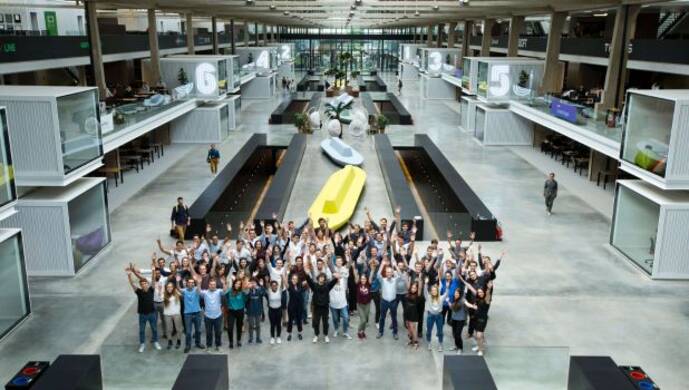How did you develop your company around sustainable innovation?
Fabien Koutchekian, CEO at Genomines: In our case, we matched our skill sets to our solution rather than building them from scratch. Genomines took a bottom-up approach. My co-founder Dali and I first mapped all the problems we cared about (this is a good "passion check" for future entrepreneurs). We chose our problem and solution—decarbonizing the mining industry via phytoextraction—because it had great founder-market fit, among many other reasons. Dali has a Ph.D. in plant biotechnology, and I am a mining engineer. This combination laid the groundwork for our nickel phytoextraction technology.
As phytoextraction is a very young industry, we target top talent with adjacent skill sets (plant biotechnology, mineral processing) and train them in our field. We're proud of the great technical team we have built (15 international researchers, 100+ years of experience).
Richard Barre, CSO at Pixstart: Our scientific skills come from the co-founders and their more than 25 years of experience. This is especially the case of our scientific director, Lydwine Gross, who holds a Ph.D. in mathematics and physical sciences applied to remote sensing. This field involves transforming sensor data into physical and biological information. Our exclusive expertise in the biophysical realm, complemented by mathematical models, allows us to develop advanced AI algorithms. Lydwine is supported by a team of PhD experts in complementary scientific fields such as environmental biology and biogeochemistry.
What challenges do you face in developing a business that is both profitable and considering the planetary boundaries?
FK: In the entrepreneurial world, investors can demand quick returns. The challenge is to prove that our long-term sustainability goals are crucial for our success.
The challenge is to prove that our long-term sustainability goals are crucial for our success.
The key to overcoming this challenge lies in effectively aligning our business and sustainability goals, and we actively filter our investors & partners for value alignment. For example, our lead investor Lowercarbon Capital is a fantastic climate tech fund and partner. Lowercarbon understands the unique challenges of climate tech startups and invests patient capital, supporting our sustainability-driven mission.
At an early stage, the lack of data is a barrier to making the best decisions and aligning economic and sustainable outcomes. To solve this, we're conducting an early Life Cycle Assessment to build a holistic understanding of the ESG impact of our value chain. By making sustainability a fundamental component of our business, we're building an advantage in asymmetric information over our competitors.
RB: It's interesting to note the common perception of challenges as a contradiction between environment and profitability. At Pixstart, we see these two aspects as inherently linked. Optimizing resource use directly translates to increased profitability through cost reduction. This is why we minimize the use of computer resources by optimizing our algorithms, thereby reducing production costs.
We promote to our clients that our satellite monitoring solutions, by reusing existing satellites, offer a significant economic and environmental advantage over alternatives such as aerial surveillance or limited-lifespan IoT devices.
Hence, economic profitability naturally follows by integrating environmental profitability from the start.
What about the social and inclusive aspects of your business?
FK: Incorporating social and inclusive elements into our business is at the core of what we do, and focus on the social benefits we can bring to the communities around us. For instance, we're conducting a Sustainable Return on Investment (S-ROI) to understand the social value we add and look for ways to enhance it. The S-ROI is a robust data point from which to focus our strategy on the greatest socially inclusive aspects of our business.
Working closely with NGOs is another core part of our strategy to ensure we contribute positively to local communities. For instance, ACTED, one of our NGO partners, is helping us to launch a phytoremediation campaign in the Philippines, supporting our business growth while providing local economic and talent development.
RB: The question of social inclusion was never posed as an obstacle. Our recruitment criteria are based on skills, interpersonal qualities, and the ability to integrate into a team. Despite the tendency for male overrepresentation in the scientific and digital fields, Pixstart is distinguished by a team of five men and seven women, likely influenced by a mixed-gender leadership.
How do you make sure that your innovation will not bring unwanted consequences, contrary to past businesses?
FK: To mitigate unintended consequences of our innovation, we've implemented a comprehensive eco-design approach from the outset, focusing on minimizing environmental and social risks. Early on, we initiated in-depth studies, including Life Cycle Assessments (LCAs) and Social Return on Investment (SROI) analyses. These studies, intended for future publication, reflect our commitment to transparency and our proactive stance on environmental and social issues. By engaging with stakeholders and the broader community openly, we aim to ensure our technology is not only safe but also positively contributes to societal and environmental well-being.
To mitigate unintended consequences of our innovation, we've implemented a comprehensive eco-design approach from the outset.
RB: It is crucial to consider the potential impact of our innovations upfront. We regularly assess the use of the information generated to ensure it aligns with our values. In case of doubt, the discussion is brought to the executive committee, and a unanimous decision is required to proceed. This approach has led us to give up on three significant opportunities without any regrets, ensuring a diversity of perspectives and limiting long-term risks.
Finally, we have oriented the company's value on environmental issues and resource security.
What do you recommend to other entrepreneurs?
FK: Be bold and creative. Don't be afraid to be different and explore new areas for the best chances of success. Sometimes, the craziest ideas lead to the biggest impacts. Even if many ideas don't work out, just one successful one can make a real difference.
RB: Stay true to your values and don't just follow the crowd. As an entrepreneur, you are an innovator, creating what does not yet exist. Your journey will be unique and should draw inspiration from your surroundings, including friends, family, and other supportive entrepreneurs who will help you question yourself.
Stay true to your values and don't just follow the crowd. As an entrepreneur, you are an innovator, creating what does not yet exist.
Maintain a balanced social life and do not try imitating personalities like Elon Musk, who probably never asked himself the previous question.
A word from the Innovation & Entrepreneurship Institute (IEI):
“Genomines and Pixstart are part of HEC’s Incubator program, hosted by Station F. They benefit from an ecosystem that, in 2023, witnessed a transformative journey. Our Center evolved into the HEC Paris Innovation and Entrepreneurship Institute. Driven by cutting-edge research, transformative education, and practical expertise from "Makers" and "Doers," our clusters metamorphosized into specialized Centers for Deep Tech, Incubation, and Social Entrepreneurship. These three distinct centers (the Deep Tech Center, Social Entrepreneurship Center, and Incubator Center) encompass seven programs to target different populations and needs. Our mission is to lead an innovative and entrepreneurial ecosystem for talents and corporate transformations, accelerating enduring and positive impact across business and society.”
- Inge Kerkloh-Devif, Senior Executive Director of the IEI at HEC Paris.






